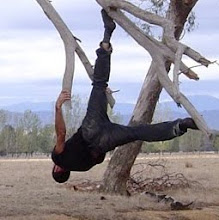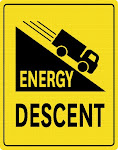All the cynicism in me remained. Obama will either be shot or fully bought within 12-24 months. And most likely we'll be just as disappointed as we are with Kevin07. So I think the emotional dunking was more for the outgoing rather than the incoming. Reading and seeing the great relief of everyday Americans while at the same time flashing through the past eight years of my own life (under Bush) was extraordinary. Fuck! he's gone. The fucker's gone.
Later in the morning a guy called Neil came to inspect our solar panels and connect us up. We watched with immense joy our electricity meter stop, then go in reverse. After he left, and in celebration of the moment, we also turned off our mains water and turned on our previously stored tank supply. Bliss.
Then an hour later we had a blackout and our solar system, which is connected to the main grid supply, went out. Because we have a small electric pump to push our water supply, we were also without water.
This naturally returned me to my hopeless-homeostasis that I've come to function so well under before two lovely peeps, Geraldine and Kyla from Monash University came to talk to me about a WorkmanJones component for a group exhibition based on detours and the absurd for later in 09.
















